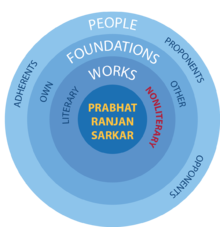Artha
| Artha | |
|---|---|
| Short description | Anything that gives temporary relief from suffering |
| Location in Sarkarverse | |
Artha (Bengali: অর্থ, Devanagari: अर्थ) is anything that gives temporary relief from suffering. In general, the word "Artha" means "wealth" or "money".[1] It also means "meaning" or "significance".[2][3]
Meaning
Anything that gives temporary liberation from suffering or bondages is called Artha. Bondages such as the necessity for food, water, clothes, accommodation, medical treatment, etc. are related to this world and are physical in nature. Anything that gives temporary relief from these bondages are called Artha. As mostly money or wealth is required to collect things like food, clothes, accommodation etc, in general "artha" means money or wealth. According to Anandamurti, human beings must continue their efforts to attain artha if they have not yet attained Paramartha.[3]
The word artha also means "meaning". In the Sanskrit sentence "Itihásati iti arthá itihása", "arha" means meaning.[4] Another meaning of artha is "intellectual pursuit". According to Anandamurti, human beings generally suffer from three afflictions or bondages— physical, mental and spiritual. That which alleviates these three afflictions is called artha. Anandamurti discusses this three spheres of afflictions—[4]
We know that in the physical sphere human beings suffer in various ways – not only from the shortage of food and clothing, but also from others pains and sorrows as well. Suppose someone falls down while walking; this is also suffering in the physical sphere.
In the psychic sphere, too, people suffer much pain, for example at the death of a beloved one. Even those people who have no problems of food, clothing, accommodation or education or medical care, also bitterly weep at the loss of their near and dear ones. This is psychic affliction.
Then there is spiritual affliction. “Parama Purusa is mine, and I am His – this I realize. Yet I cannot make Him exclusively my own at all times.” This affliction of not attaining Parama Purusa as close as one desires, is spiritual affliction.
References
- ^ Prabhat Ranjan Sarkar Samskrta glossary Ananda Marga Pracarka Samgha
- ^ Shrii Shrii Anandamurti "This World and the Next" Subháśita Saḿgraha Part 4
- ^ a b Shrii Shrii Anandamurti "Yatamána – 2" Ananda Marga Philosophy in a Nutshell Part 5
- ^ a b Prabhat Ranjan Sarkar "Verse, Mythology, History and Itihása" A Few Problems Solved Part 3
